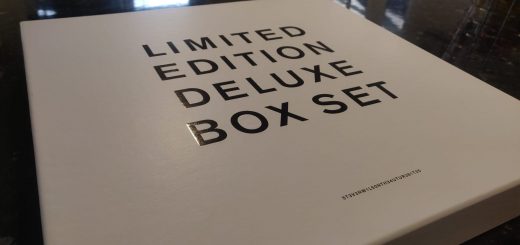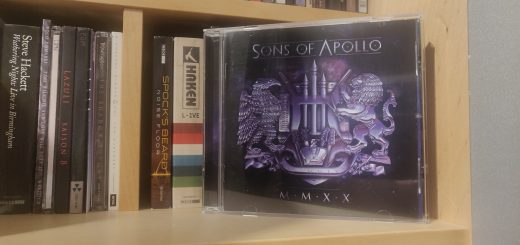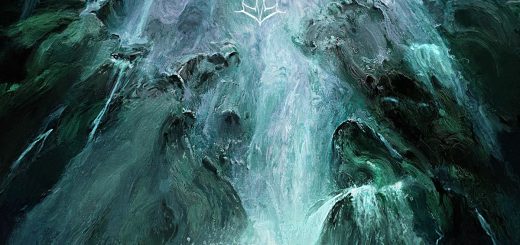Ihsahn: ‘Ihsahn’ Review

The album artwork for Ihsahn
Norway’s black metal scene is one of contrast. Since the 1990s, it has been a constant vantage point for some of the most brutal and unforgiving music to be inserted into earholes – with a casual murder or church burning thrown in there in the early days, just to add to proceedings. It’s also home to catchy melodic sensibilities, some of the most sophisticated musicianship and high-concept existentialism.
There are a few places where these two meet but perhaps the one with the most longevity is the musical output of Veigard Tveitan, better known as Ihsahn: Since the 1990s, this man has established himself as one of black metal’s premier innovators. A driving force in Emperor’s supersized symphonics, he then went on to collaborate with his wife Starofash in the short-lived (and underdiscussed) Peccatum project before forging a solitary path, where his studio output has since focused. Across seven prior albums and three EPs, Ihsahn has continued to explore (and often deviate from) his black metal roots with contributions from his friends along the way – past collaborators include Mikael Åkerfeldt, Devin Townsend and brother-in-law Einar Solberg among others.
So where he has chosen to take his eighth solo album is interesting, to say the least.
Furthermore, the choice to make it self-titled is a bold one, the double-disc approach where the first disc is his more traditional metal fare and the second is orchestral interpretations of the album (Johns of the Williams and Carpenter variety are both cited as influences) is even bolder. The interlocking nature of the compositions allows for a more intimate – perhaps claustrophobic being that the mood is very much “attack” – sound, albeit a different approach to the fullness of prior record Eremita. The decision to allow the orchestral composition to live and breathe in its own right warrants its own consideration, with the metallic half first to be explored:
The opening notes of the orchestral overture Cervus Venator do incredibly well to set the tone before The Promethean Spark kicks in. What surges forth among the blackened tones is, of course, a visceral display of harsh vocals that seasoned Ihsahn enjoyers will doubtless be familiar with. Where this self-titled fare separates itself from prior work, though, is twofold: an improvement in the clean vocal department is immediately evident as the chorus hits, but more so, that orchestral layer adds a depth previously unexplored.
The more symphonic sound is ever-present: Twice Born catapults you into a dense and claustrophobic soundscape where strings swirl and guitars throw you around like you’re nothing. Earlier Ihsahn material has achieved this feeling of organised chaos, particularly his work with Emperor, but never quite like this. This is coupled with the ever-intense drumming of Ihsahn alumni (and ex-Leprous drummer) Tobias Ørnes Andersen – he gets some great fills in on the unconventional track Blood Trails to Love, trading fills with evocative strings while the next hook and riff loom ever closer.
It’s track Hubris and Blue Devils shows itself to be a great representation of Ihsahn as an artist in this era, however, pairing tremolo riffing, huge soundscapes, more dynamic moments and a strong blend of harsh and hook. This song is a voyage – it travels through so much of what we know Ihsahn to be (even getting a few references to earlier work in the lyrics), while covering new ground for him, with its up-front orchestral focus.
Closer At the Heart of All Things Broken is aptly titled as it proves itself to be the heart of the album, and perhaps the best track, with strings that stir and the most centred use of the oft-mentioned symphony yet. Tveitan’s clean vocals are front and centre here, in all their vulnerability – with his usual riproarious harsh vocals emerging both in singular and layered fashions. As the song swirls towards crescendo, the symphonic backing makes itself felt and leaves a great feeling of satisfaction as the song reaches its climax. We’re awarded with a final epilogue in Sonata Profana and then the album rests.
But of course, it’s not over – there’s a whole second disc where the compositions are introduced in a completely different light: divorced from the metal elements that emboldened the first disc, you can hear the amount of thought that went into these pieces that the more traditional metal instrumentation perfectly interlocked into – the dynamic depth of tracks like Pilgrimage to Oblivion are fully understood when taking these pure orchestral compositions as their own.
These are fully formed pieces, which when metal is added to them, do not become better – just different. The previously cited influence of John Williams is present, but elements of Ihsahn’s more familiar composition style are all there – the dynamics, the claustrophobia. None of this feels tacked on or out of character for Tveitan – if he were to release these pieces in isolation, nobody would bat an eye. That he wrote these first and then managed to mix in his bread and butter is all the more impressive considering how much depth there already is to be mined from the orchestral compositions alone.
Twice Born swoops between a trail of strings and horns, with subtle percussive flair. Blood Trails to Love is perhaps the most dynamic track of the orchestral set, with its flightier segments in what would be the chorus of the metal arrangement really elevating the piece. A very sombre iteration of The Distance Between Us is a highlight, with a largely minimalist arrangement occasionally giving way to a more pronounced and dark flair that wouldn’t feel out of place in a “Darth Vader doing vaguely terrifying things” supercut. The overall depth and dynamic sensibilities of the composition are not new for Ihsahn, albeit never approached quite like this. It’s a refreshing approach and through this second disc, he has certainly shown himself to be an incredibly competent composer, an area I hope he keeps exploring.
But don’t despair, folk of the trve kvlt, for at least the first disc is all still relatively familiar territory: the symphonic black metal that has been ever-present throughout his career is still largely recognisable in its execution, albeit never so pronounced in its use of the orchestra, never quite at this level of interlock. The density of composition does come with one sacrifice – some of the classic guitar hero moments are lost in favour of a more direct vocal-driven approach. All is not lost however, as there are still plenty of strong riffs to headbang along to!
Three decades into his career as a recording artist, Ihsahn is still producing some of the finest black metal, and this self-titled album is no different. The vocals – particularly cleans – flourish in their development. The production is monumental and biting in its density. What’s most impressive of all is his commitment to the orchestral element, presented both within a metal context and in its own right and more than earning its place as a second disc of compositions. Indeed this might be the “most Ihsahn” album: With such a storied career it’s no surprise that Ihsahn has constantly evolved and innovated in his music, but this may be his finest innovation yet.









